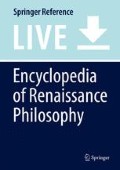Abstract
The incorporation and elevation of practical knowledge was one of the most important innovations in Renaissance natural philosophy. Manipulating nature for productive ends came to be seen as a principle means of studying the natural world and the ability to do so as the best evidence that a true understanding had been achieved. As improving the human condition through the acquisition of practical knowledge gradually became a vital goal of pursuing natural philosophy, the social and intellectual status of those who possessed it was enhanced through their association with elite patrons and power brokers. At the same time, those elite patrons increased their own power and status by harnessing their clients’ practical knowledge, both to enrich themselves and to bolster the power and legitimacy of the burgeoning early modern nation-state.
References
Primary Literature
Agricola, Georgius. 1556/1950. De re metallica. Trans. Herbert Clark Hoover and Lou Henry Hoover. New York: Dover Publications.
Alberti, Leon Battista. 1435/2011. On painting. Trans. Rocco Sinisgalli. Cambridge: Cambridge University Press.
Alberti, Leon Battista. 1485/1988. On the art of building in ten books. Trans. Joseph Rykwert, Niel Leach, and Robert Tavernor. Cambridge, MA: MIT Press.
Bacon, Francis. 1620/2000. The new organon, ed. Lisa Jardine and Michael Silverthorne. Cambridge: Cambridge University Press.
Bacon, Francis. 1628/1999. New Atlantis. In Three early modern Utopias: Utopia, new atlantis, and the isle of pines, ed. Susan Bruce. Oxford: Oxford University Press.
Biringuccio, Vannoccio. 1540/1959. The pirotechnia of Vannoccio Biringuccio: The classic sixteenth-century treatise on metals and metallurgy. Trans. Cyril Stanley Smith and Martha Teach Gnudi. New York: Basic Books.
Da Vinci, Leonardo. 2008. In Notebooks, ed. Richter Irma. Oxford: Oxford University Press.
Pollio, Marcus Vitruvius. 1914. Ten books on architecture. Trans. Morris H. Morgan. Cambridge, MA: Harvard University Press.
Sprat, Thomas. 1667/1959. History of the royal society, ed. Jackson I. Cope and Harold Whitmore. London: Routledge & L. Paul.
Tartaglia, Niccolò. 1537. La nova scientia. Venice.
Secondary Literature
Ash, Eric H. 2004. Power, knowledge, and expertise in Elizabethan England. Baltimore: Johns Hopkins University Press.
Ash, Eric H. (ed.). 2010. Expertise: Practical knowledge and the early modern state. Osiris, vol. 25. Chicago: University of Chicago Press.
Dear, Peter. 1995. Discipline and experience: The mathematical way in the scientific revolution. Chicago: University of Chicago Press.
Harkness, Deborah E. 2007. The jewel house: Elizabethan London and the scientific revolution. New Haven: Yale University Press.
Long, Pamela O. 2001. Openness, secrecy, authorship: Technical arts and the culture of knowledge from antiquity to the renaissance. Baltimore: Johns Hopkins University Press.
Long, Pamela O. 2011. Artisan/practitioners and the rise of the new sciences, 1400–1600. Corvallis: Oregon State University Press.
Newman, William R. 2004. Promethean ambitions: Alchemy and the quest to perfect nature. Chicago: University of Chicago Press.
Pérez-Ramos, Antonio. 1988. Francis Bacon’s idea of science and the maker’s knowledge tradition. Oxford: Oxford University Press.
Roberts, Lissa, Simon Schaffer, and Peter Dear (eds.). 2007. The mindful hand: Inquiry and invention from the late renaissance to early industrialization. Chicago: University of Chicago Press.
Smith, Pamela H. 1994. The business of alchemy: Science and culture in the holy roman empire. Princeton: Princeton University Press.
Smith, Pamela H. 2004. The body of the artisan: Art and experience in the scientific revolution. Chicago: University of Chicago Press.
Smith, Pamela H., and Paula Findlen. 2001. Merchants and marvels: Commerce, science, and art in early modern Europe. New York: Routledge.
Smith, Pamela H., and Benjamin Schmidt (eds.). 2008. Making knowledge in early modern Europe: Practices, objects, and texts, 1400–1800. Chicago: University of Chicago Press.
Stewart, Larry. 1992. The rise of public science: Rhetoric, technology, and natural philosophy in Newtonian Britain, 1660–1750. Cambridge: Cambridge University Press.
Author information
Authors and Affiliations
Corresponding author
Editor information
Editors and Affiliations
Rights and permissions
Copyright information
© 2016 Springer International Publishing Switzerland
About this entry
Cite this entry
Ash, E.H. (2016). Practical Knowledge. In: Sgarbi, M. (eds) Encyclopedia of Renaissance Philosophy. Springer, Cham. https://doi.org/10.1007/978-3-319-02848-4_965-1
Download citation
DOI: https://doi.org/10.1007/978-3-319-02848-4_965-1
Received:
Accepted:
Published:
Publisher Name: Springer, Cham
Online ISBN: 978-3-319-02848-4
eBook Packages: Springer Reference Religion and PhilosophyReference Module Humanities and Social SciencesReference Module Humanities

